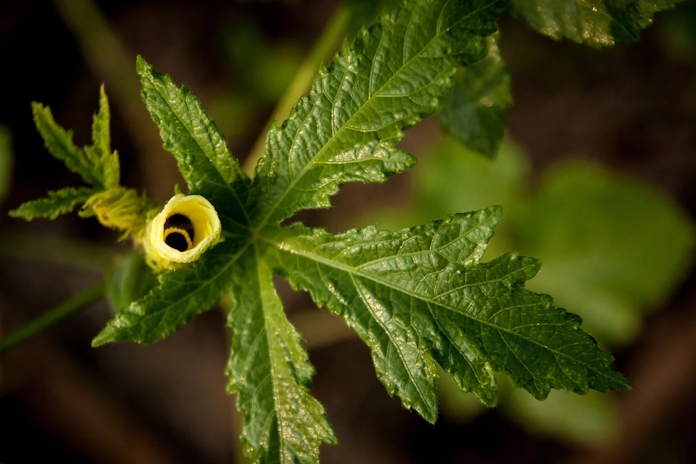
10 Surprising Plants That Look Like Weed
Seeing double in the garden? Not every green doppelgänger is the cannabis you might think it is.
The botanical realm is filled with intrigue, and nestled within its vast tapestry lies the renowned cannabis plant. Steeped in history and culture, cannabis plants boast unmistakable features.
Yet, its lookalikes can beguile even the most observant eyes, leading many to wonder, “What does a marijuana plant look like?” Mastery in discerning the true cannabis plant from plants that look like marijuana is an art, and it’s about time we perfected it.
What Does A Marijuana Plant Look Like? How Can You Identify It?
To the connoisseur, a cannabis plant is immediately recognizable. But given the vast variety of plants out there, a deep dive into its unique features is necessary to tell it apart from its botanical brethren.
Its distinct pungent aroma, sometimes reminiscent of skunk, is unmistakable to the initiated.
Chunky formations are protected by smaller “sugar leaves” that evolve in their appearance, with hair-like pistils adopting a deep burnt orange color during flowering. Mature buds glisten, attributed to the abundance of resinous trichomes that coat them.
The term “cola” refers to the plant’s main flower site, where clusters of buds grow tightly together. As the plant matures, these colas can become particularly dense and elongated, especially in well-cared-for plants. They are usually covered in a thick layer of trichomes, giving them a frosty appearance. The presence and formation of prominent colas can help in identifying a mature cannabis plant.
Cannabis plants often reach heights of 6 feet or more. Some strains, particularly when grown outdoors with ample space and resources, can even tower at 12 feet or higher. This lanky growth is a distinguishing feature of many Sativa varieties.
Dark brown in color and peppered with tiger-like stripes. Similar in size to peppercorns but uniquely identifiable to those familiar with cannabis seeds.
Tiny, glistening outgrowths or hair-like structures on the plant are responsible for the production of cannabinoids, the chemicals responsible for the medical and recreational effects of cannabis.
These characteristics, when observed closely, answer the question of “how to identify a weed plant” and make it evident that one is indeed looking at genuine Cannabis sativa, setting it apart from its many lookalikes in the plant world.
Why Does Identifying Real Cannabis Matter?
Mistaking another plant that looks like weed can lead to a host of complications, from unwarranted legal troubles to health risks. Here’s why pinpointing real cannabis is more than just a botanical exercise:
Think of the unfortunate scenario where a neighbor’s innocuous plant leads to unwarranted legal scrutiny. Accurate identification not only safeguards personal freedom but fosters community harmony. No one desires the needless strain of a false report.
As the cannabis industry thrives, so do opportunities for deceit. Discerning between genuine cannabis and its lookalikes can be the difference between an authentic purchase and an expensive faux pas. Dealers, consumers, and enthusiasts alike benefit from this knowledge.
The stakes rise exponentially when consuming a plant. The real danger lurks in mistaking a toxic lookalike for cannabis. Certain plants, when ingested or smoked, unleash a cocktail of harmful chemicals. Being able to tell them apart can, quite literally, save lives.
With varying legal landscapes around cannabis cultivation, correctly identifying your plants can keep unwanted legal troubles at bay.
Being adept at spotting the real deal amidst its many mimics is more than a party trick – it’s a shield for your health, wallet, and gardening ventures.
11 Common Plants That Often Get Mistaken for Cannabis
Nature is truly a master of imitation, and when it comes to cannabis, a plethora of plants bear a deceptive resemblance to the beloved green herb. Here’s an enlightening journey through some doppelgängers of the cannabis world:
1. Japanese Maple
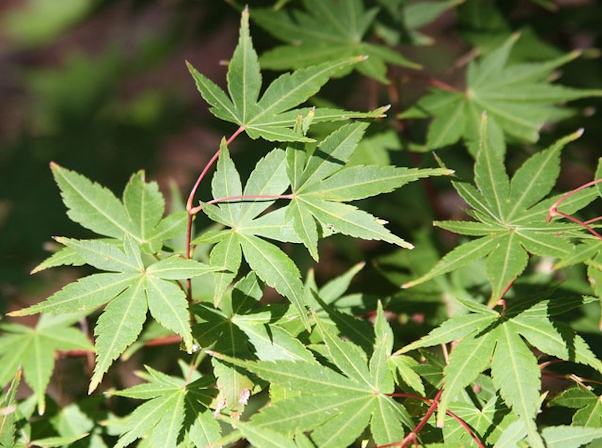
A darling of gardens, especially in spring, its leaves sport the characteristic jagged edges often associated with cannabis. But come summer, its foliage bursts into a fiery red, clearly setting it apart. While not sharing cannabis’s renowned attributes, Japanese Maple offers medicinal benefits, such as treating eye inflammation and liver issues. Its sap is even used as a sweetener!
2. Southern Marigold
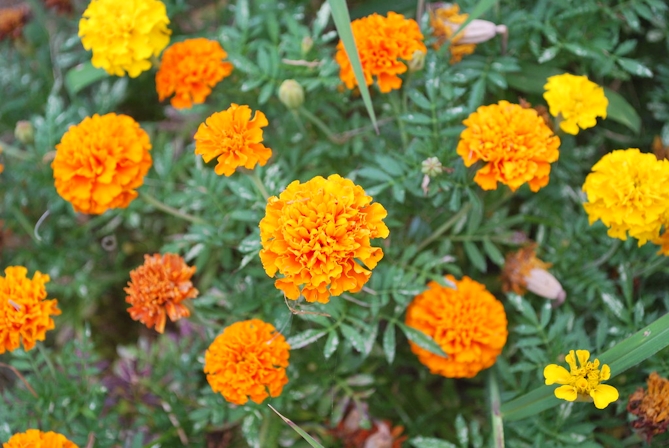
At a fleeting glance, the Southern Marigold’s vibrant green, lobed leaves could be misleading, drawing parallels with cannabis. However, any such illusion is promptly dispelled by its radiant yellow blossoms, distinctly setting it apart. Beyond its aesthetic charm, marigolds carry a practical edge too — they are celebrated in gardening circles for their prowess in keeping pesky pests at bay.
3. Sunn Hemp
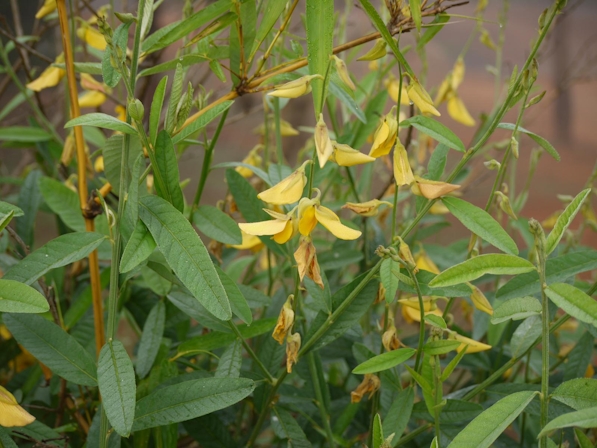
Though its leaves resemble those of the cannabis plant, Sunn Hemp stands apart with its tall growth and striking yellow flowers. Originating from South Asia, this leguminous plant is more than just a look-alike. Valued in agriculture, it enhances soil quality, improving fertility and combatting soil-borne pests, making it a top choice for sustainable farming practices.
4. Okra
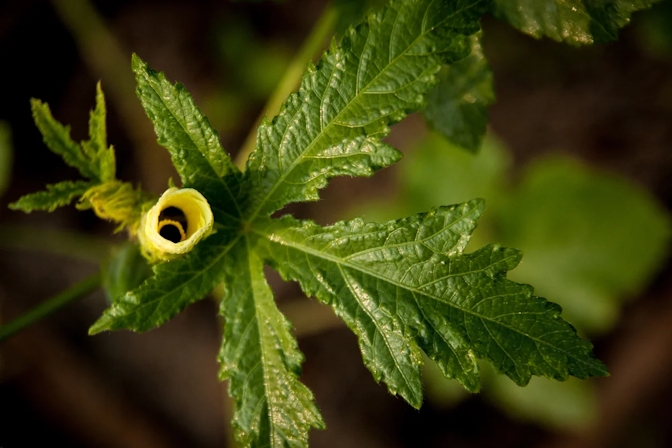
Imagine the surprise of a Cartersville man awakened by a chopper, county deputies, and a K-9 unit, all mistaking his okra garden for a marijuana plantation. With leaves and buds reminiscent of cannabis, it’s easy to see how this confusion occurred.
While smoking okra is ill-advised, incorporating it into meals offers numerous benefits: from diabetes control and being a high-fiber ingredient to acting as a carb-free thickener for sauces and soups, and a rich source of antioxidants and minerals. Its distinct pods, a favorite in various dishes, firmly establish its true identity.
5. Cassava
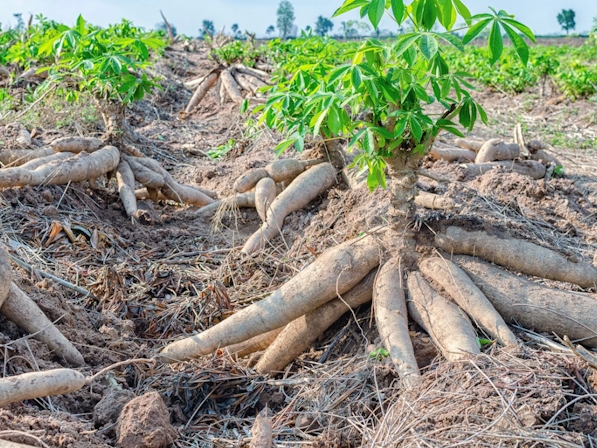
At first glance, Cassava’s seven yellowish-green leaves might evoke images of cannabis, leading to occasional confusion. Yet, distinct features set it apart: its red branches and the unique tuberous roots hidden beneath the soil. These roots, though toxic in their raw state, transform into delicious and nutritious staples once properly cooked.
They’ve carved a niche in global cuisines, gracing dishes from Taiwanese boba tea and Bermudan cassava pie to South American yuca fries. Packed with vitamin C and healthful carbohydrates, Cassava is a testament to nature’s bounty. Still, caution prevails: always be certain of a plant’s identity before consumption.
6. Spider Flower
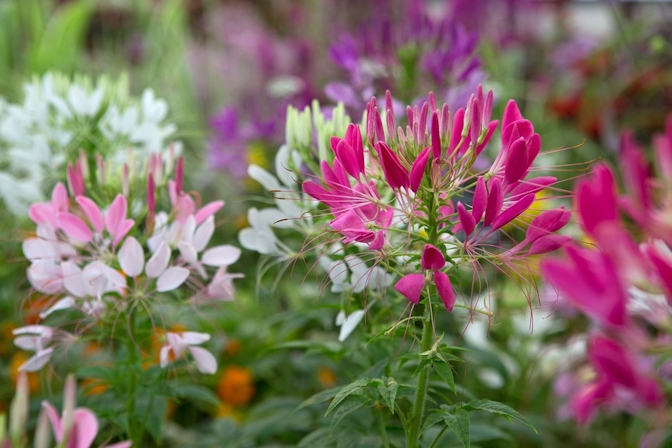
Cleome hasseleriana Colour Fountains
tall half hardy annual mixed colours flowering spider flower good for pollinators bees 240713 24071324/07/13 24/07/2013 24 24th July 2013 RHS Flower Show Tatton Park 2013 Photographer Sarah Cuttle Summer plant portraits
The jagged edges of its leaves may momentarily conjure images of cannabis, but the Spider Flower’s distinct and intricate blooms quickly dispel any such notion. Cultivated primarily for its ornamental value, this captivating plant showcases a floral palette ranging from pristine whites to delicate pinks and deep purples.
7. Texas Star Hibiscus
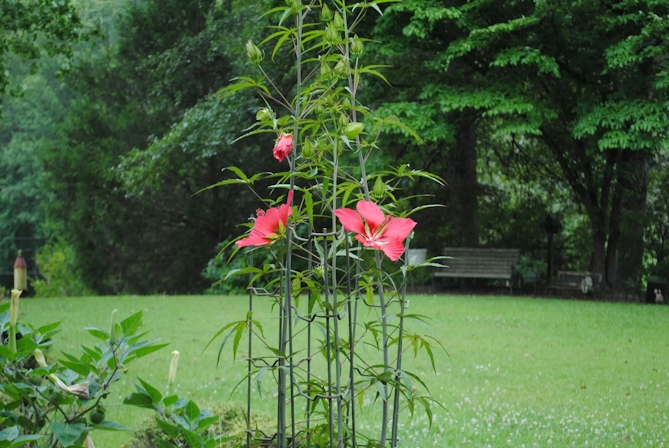
Boasting slender branches with thin, pointy leaves reminiscent of cannabis, the Texas Star stands out when it unfurls its iconic star-shaped red blooms. While its leaves may mirror those of cannabis, its distinct flowers set it apart. Often planted for its aesthetic appeal, this plant is a magnet for vibrant creatures like hummingbirds and butterflies.
8. Kenaf
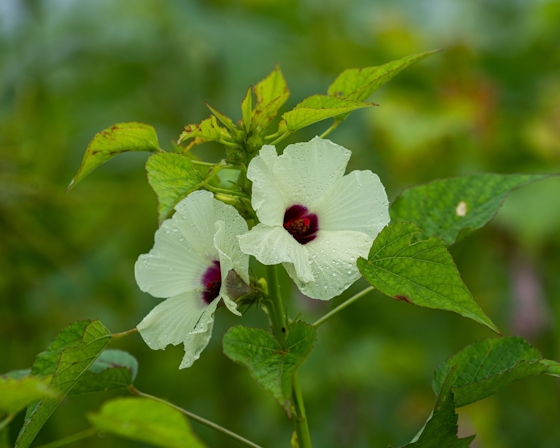
Resembling cannabis with its star-like leaf pattern and rough texture, Kenaf is closely related to hemp and is renowned for its strong fibers. As it flowers, distinct white and crimson blossoms emerge, dispelling any cannabis resemblance. Its fibers are sought-after for products like bags and ropes, while its seeds find culinary uses and are also extracted for oil.
9. Chaste Tree
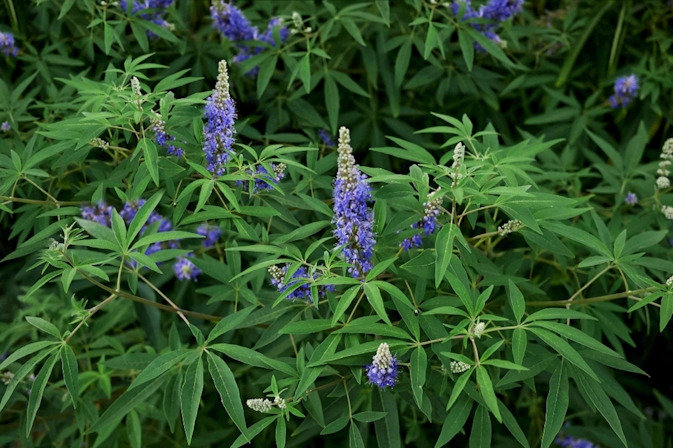
Sporting leaves with a pattern that echoes cannabis, the Chaste Tree stands apart with its soft, smooth blades bunched up on each stem, all anchored to a solid trunk. While its leafy facade might deceive at first, its brown trunk and late spring blossoming of lilac flowers dispel any cannabis comparisons.
Renowned as Vitex agnus-castus, this tree is heralded for its health benefits, especially for women, assisting in menstrual regulation, hormone rebalancing, and fertility enhancement.
10. Acacia
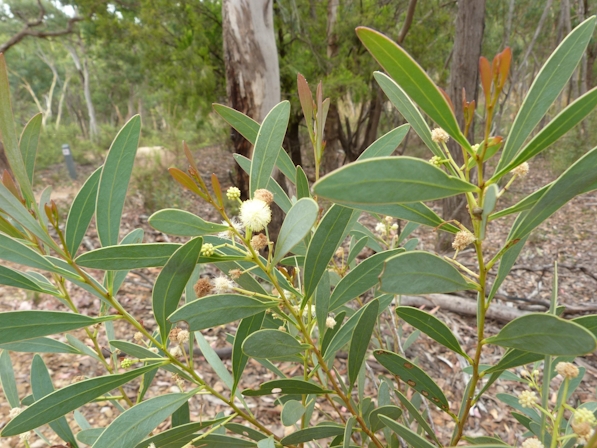
In their nascent stages, Acacia plants, with their delicate, feathery foliage, can momentarily deceive the observer into likening them to cannabis. Yet, as they mature, Acacias assert their distinct identity, brandishing elongated thorns and spherical floral clusters. Moreover, various species of this tree have been historically revered for the medicinal attributes of their gum and bark.
Herb Recommended Products:
READ MORE










